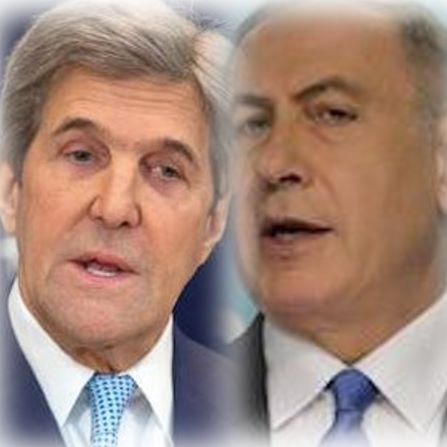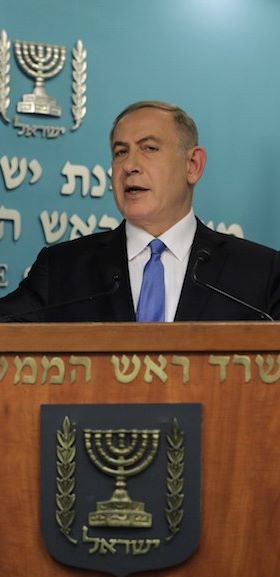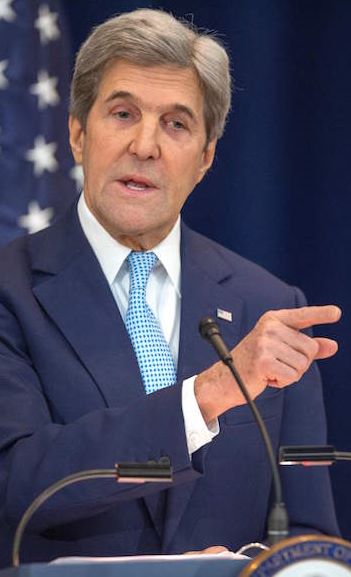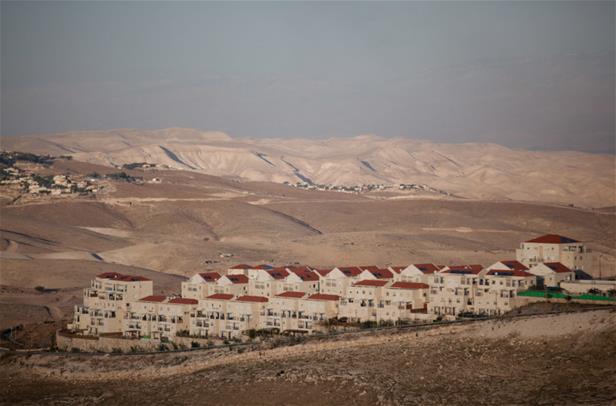
Banner

Kerry and Netanyahu continue to duke it out
ANT KATZ with BEN SALES, JTA
In remarks from the State Department on Wednesday, the American secretary of state reiterated the US’ vehement opposition to Israeli settlement construction and its belief that chances for peace would disintegrate further with more settlement construction.
Israeli prime minister Benjamin Netanyahu countered shortly after Kerry’s speech that settlements are not the issue and if peace prospects are receding, it’s because of Palestinian rejectionism.
 “The settler agenda is defining the future of Israel, and their stated purpose is clear: They believe in one state, greater Israel,” Kerry said in remarks carried live from the State Department.
“The settler agenda is defining the future of Israel, and their stated purpose is clear: They believe in one state, greater Israel,” Kerry said in remarks carried live from the State Department.
Barely an hour later, Netanyahu was having none of that.
“If only the https://www.sajr.co.za/images/default-source/People/single/kerry-speech.jpg” class=”sfImageWrapper”> “I do think he cares deeply about this, he thinks he’s saving Israel from itself,” David Makovsky, who worked under Kerry during the latest round of peace talks in 2013-14, said on a conference call Thursday hosted by the Jewish Federations of North American.
“I do think he cares deeply about this, he thinks he’s saving Israel from itself,” David Makovsky, who worked under Kerry during the latest round of peace talks in 2013-14, said on a conference call Thursday hosted by the Jewish Federations of North American.
Click here to see video of Kerry’s speech in full
“If it’s going to be a Jewish state and democratic, he’s going to share those lessons. He can’t just walk off the stage.”
Makovsky, who is also a fellow at the Washington Institute for Near East Policy, noted that Kerry spoke shortly before a French-led summit on the peace process, which Israel is boycotting, and said the address may be meant as preparation for the gathering. But Kerry’s personal investment in guiding Israel to a two-state solution also motivated this one last call for peace, Makovsky added.
When Clinton issued his parameters, Israel and the Palestinian Authority were in ongoing negotiations and a Palestinian state seemed within reach. Peace seems far less likely now, with the Israeli government leaning firmly to the right and the Palestinians still unwilling to negotiate directly.
By the numbers…
Kerry admitted as much in his speech. Intended as a strident defence of a two-state solution, the speech in fact showed how difficult such a solution would be to achieve now. Even as he blasted the ballooning of Israeli settlements, saying that 270,000 more settlers are living in the West Bank since Obama took office, Kerry also criticised the Palestinians for ongoing incitement and glorification of terrorists.
“Despite our best efforts over the years, the two-state solution is now in serious jeopardy,” Kerry said. “The truth is that trends on the ground — violence, terrorism, incitement, settlement expansion and the seemingly endless occupation — are combining to destroy hopes for peace on both sides and increasingly cementing an irreversible one-state reality that most people do not actually want.”
The speeches were effectively closing arguments to a longstanding debate in the waning days of the Obama administration.
A defensive Netanyahu sounded incredulous that Kerry was focused on blaming Israel when so many other problems plagued the Middle East. And as he has many times before, the prime minister described Israel not as an occupier but as the sole democratic society in a chaotic region.
“This is what the secretary of state focuses on as one of his concluding speeches?” Netanyahu said.
“The whole Middle East is going up in flames, full states are collapsing, terror is spreading and for an hour the secretary of state attacks the only democracy in the Middle East,” said Netanyahu Thursday, repeating that Israel is the only force that keeps an element of stability in the Middle East.”
Kerry, for his part, had taken nearly an hour to get to his six principles for peace – an hour spent defending the administration’s record on Israel, in particular its refusal to veto a United Nations Security Council (UNSC) resolution last week labelling the settlements as illegal.
“If we had vetoed this resolution just the other day, the United States would have been giving license to further unfettered settlement expansion that we fervently oppose,” Kerry said. “It is not this resolution that is isolating Israel. It is the pernicious policy of settlement construction that is making peace impossible.”
Kerry’s speech also was an attempt to lay out longstanding American policy on Israel before President-elect Donald Trump takes office. American presidents since 1967 have opposed settlement construction, and recent administrations have explicitly called for a Palestinian state.
But Trump’s nominee for ambassador to Israel, David Friedman, is a settlement supporter who has suggested the two-state solution ought to be reconsidered.
Netanyahu said he looks forward to working with Trump, who joined him in attempting to block last week’s Security Council resolution. And Kerry noted that in a few weeks, an administration will take office that may be far more amenable to Netanyahu’s positions.
“President Obama and I know that the incoming administration has signalled that they may take a different path, and even suggested breaking from the long-standing U.S. policies on settlements — Jerusalem and the possibility of a two-state solution,” Kerry said.
“That is for them to decide, that’s how we work.”
In other words, the eight-year debate could soon be over.

A view of the Israeli settlement of Maale Adumim (Uriel Sinai/Getty Images)




